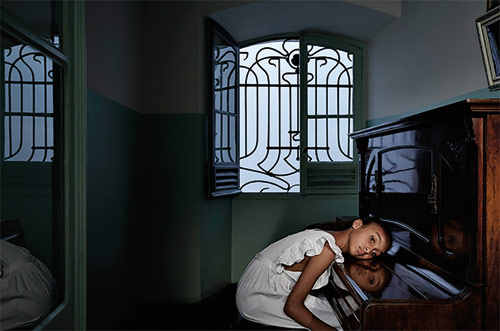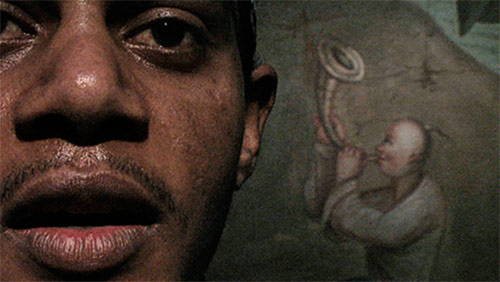2014 / 2006-2007
Danica Dakić in collaboration with the children and staff of the Colégio de Santa Inês, with the photographer Egbert Trogemann (Céu)
In dialogue with visual anthropology and performance theory, Danica Dakić films and photographs in liminal spaces that define both a state of aesthetic openness and a working method.

For Céu [Heaven], her starting point is the delicate Art Nouveau building of a traditional Italian school in the immigrant neighbourhood of Bom Retiro. The European-like architecture in a modern South American metropolis impressed Dakić in two opposite directions: as a place that carries a memory that can no longer be deciphered; and, as she herself puts it, ‘the continuity of non-destruction’ caused by European wars – in reference to the Balkans, her region of origin. The name of the film is the same of the last square in the hopscotch game. The narrative alternates between shots of children in old-fashioned uniforms, an elderly nun sat in front of a piano and a little girl running around the building, playing music and hopscotch. The work was realised in an open process so that the children could use the film set as a productive and fictional space to create a journey through parallel worlds and times in which ‘heaven’ is not only a square painted on the floor, nor the place of afterlife concept, but a place of action, between dream and trauma.

In El Dorado, Dakić gathers youngsters from a refugee home to perform in front of the nineteenth-century panoramic wallpaper of the same name at Kassel’s Wallpaper Museum. In the museum’s gallery two historical times are brought together: the colonial past of European countries collecting images of a conquered world, and, as a consequence of the former, the present forced mobility of these young refugees. Dakić invited the film’s protagonists to performatively think about and modify their own particular existence in this unusual environment. Dancing, running and rapping, the bodies of the refugees are no longer solely sites of inscription of absolute power, but on the contrary become bearers and producers of ideas and utopias, and thus of options for action. – BS/GE